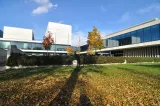Administrative officers at the Department
Head: prof. Ing. Roman Jambor Ph.D.
Vice head: Ing. Petr Knotek, Ph.D.
Head assistant: Ing. Pavlína Ruleová, Ph.D.
Secretary: Mrs. Jaroslava Siantová
Profile
Department of General and Inorganic Chemistry formed a basic part of Institute of Chemical Technology - VŠCHT (the predecessor of the present Faculty of Chemical Technology, the University of Pardubice) from its very beginning (1953). The Department has been responsible for teaching general and inorganic chemistry in the basic undergraduate study programs. Actually, this has been the first chemical subject encountered by the student, where he has learnt the first coherent ideas about chemistry.
The origins and later development in pedagogical field as well as the profile of the Department's scientific activities are inseparably connected with the name of its long-term head and, at the same time, rector of VŠCHT, Prof. Ing. Jiří Klikorka, DrSc. He takes credit for the fact that the teaching of general and inorganic chemistry was based on the most recent scientific results and was steadily innovated. Soon after formation of the Department and stabilisation of its staff, scientific activities began to develop particularly in the following areas:
- study of physical (above all, electric) properties of metal chalcogenides
- study of biologically and catalytically active metallocenes
- study of synthesis and properties of organometallic compounds including their biological and catalytic activity
Within these scientific fields, the Department has established very good reputation among the scientific community. In this context it is necessary to mention the contributions of Prof. Ing. Jaromír Horák, DrSc. and Prof. Ing. Miloslav Frumar, DrSc. and also Prof. Ing. Ivan Pavlík, CSc. and Prof. Ing. Jaroslav Holeček, DrSc., who have taken decisive credit for that.
The above-mentioned fundamental lines of scientific work of the Department became a basis for two study programs, namely material engineering and inorganic and bioinorganic chemistry. Students in these programs obtain top knowledge and skills in the respective fields. The best of the students can continue these programs at postgraduate (PhD) level.
Services and advisory activities
1. Preparation and identification of inorganic and organometallic compounds
- properties and structure of these compounds
- applications of these compounds in biological contexts
2. Materials
- methods of syntheses of current and special inorganic materials
- methods of preparation of single crystals and amorphous materials
- problems of investigation of structure (interpretation of results of structural analysis, real structure of solids, non-stoichiometry)
- characterisation of poly-crystalline materials (measurements of particle size and distribution of particle sizes)
- relationships between technology of production, structure and properties of materials
3. Phenomena
- optical and electric properties of crystalline and amorphous semiconductors
- interpretation of results of measurements of OTA, EPR, IR, NMR and Raman spectroscopy
- problems connected with relationships between chemical composition (purity), structure and properties of semiconducing crystals and glasses
- relationships between structure and catalytic and/or biological activities of organometallic and coordination compounds

